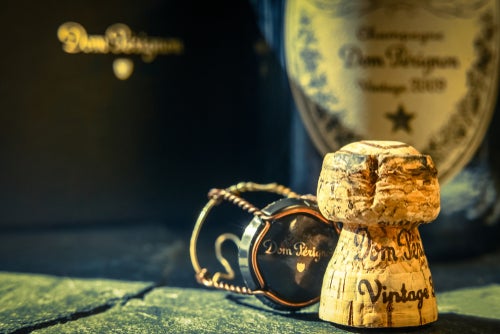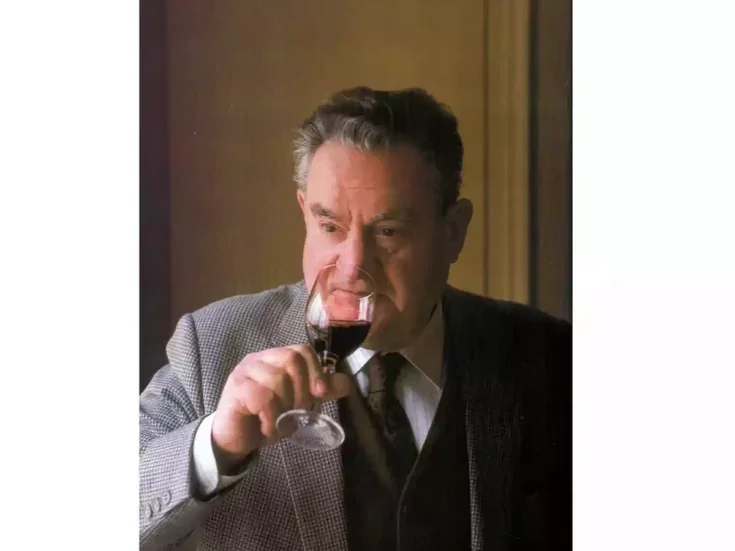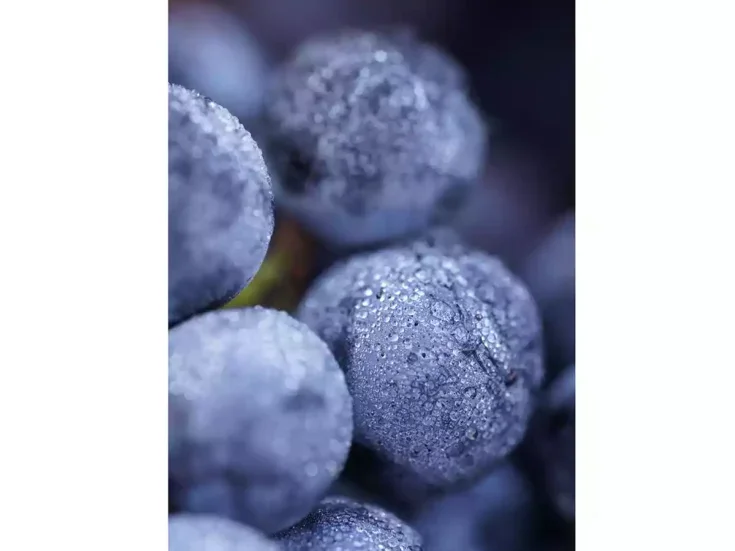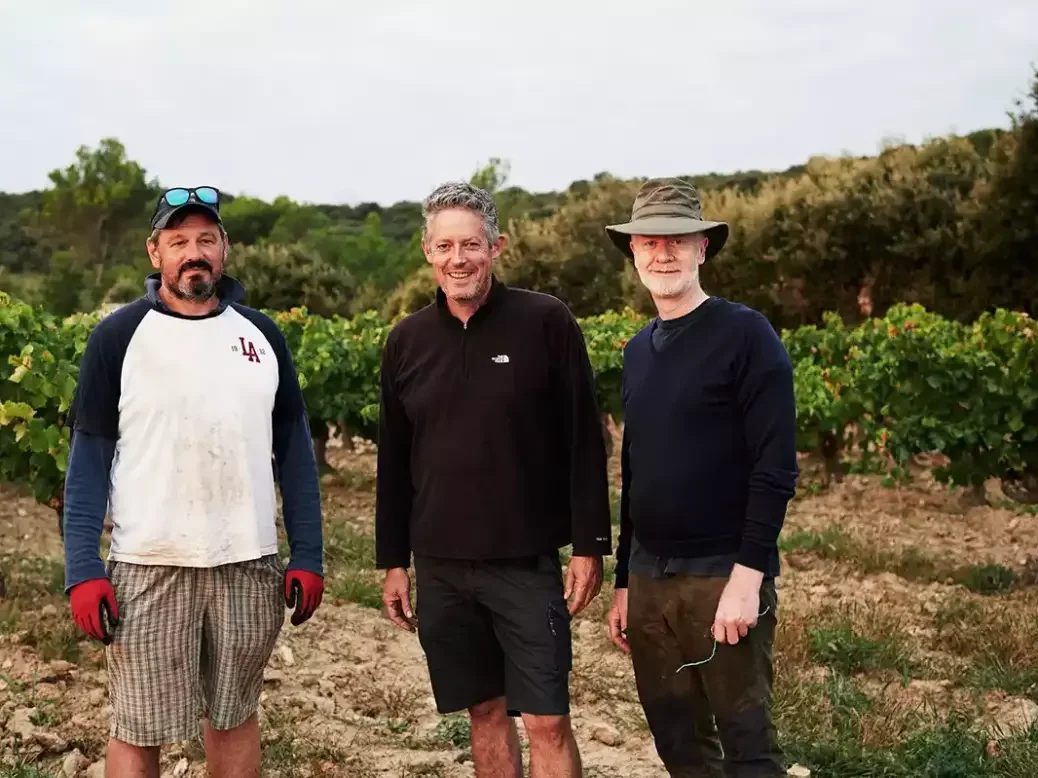
Raymond Blake on the romance and reality of Les Deux Cols, a collaboration that began in Dublin and is now producing increasingly refined wines in the Rhône Valley.
Much has been written about the strong Irish wine connections to Bordeaux, made manifest in château names such as Léoville Barton and Lynch-Bages, and négociants such as Lawton. Valid Hibernian claims can also be made for far-distant regions—Clare Valley in Australia springs to mind—and, though some of the links have been eroded over time, Irish wine lovers are never slow to engage in some genealogical wizardry to fan the embers of a connection that may be more historical than contemporary. No such sleight of hand is needed in the case of Les Deux Cols, in the Rhône Valley, whose genesis barely extends back to the end of the past century.
Charles Derain from Toulouse—the “half” of the triumvirate—arrived in Ireland to work as a sommelier in 1999, having qualified from the Lycée Hotelier de Tain l’Hermitage, with some winemaking experience at Domaine Alain Graillot in Crozes-Hermitage to boost his credentials. He quickly established a reputation as Ireland’s finest sommelier, and members of the wine trade keen to sell him wine could be assured that they were dealing with someone who “knew his onions.” One of these was Simon Tyrrell, who had his own distribution business specializing in wines from the Rhône Valley. The two quickly established a rapport that developed into a firm friendship, leading eventually to talk of making wine together. But not before Derain hung up his corkscrew in 2007 and jumped the fence, as it were, to set up his own importing company, Nomad Wine, selling wine from many of Burgundy’s finest domaines to independents and restaurants, including his previous employer. The hospitality business’s loss was the wider wine world’s gain.
Tyrrell takes up the story: “We had known each other for a good while. I started selling wine to Charles in about 2000. We had an immediate connection because I was selling a portfolio of wines from the Rhône, and he knew a lot of them quite well… We had begun to talk about the possibility of doing a small négoce business in Burgundy, which we actually did for a few years, but I think we underestimated the skills required to run what was a relatively time-consuming and financially consuming business.”
In the late noughties, the duo continued to take faltering steps toward making their own wine, but Tyrrell eventually realized that he needed more formal knowledge to accelerate their plans and reach their eventual goal. In 2009 he enrolled at Plumpton College in the UK to study viticulture and enology for two years, all the while continuing the conversation with Derain, gradually settling on a plan to establish a négoce business, “to make some wine together in the Rhône. But at that point we didn’t necessarily think we would end up buying vineyards. We thought it would just really be a grape-purchasing négoce business to start with.”
As well as teaching him the technical aspects of grape-growing and winemaking, Plumpton equipped Tyrrell with a clear-headed appreciation of what lay ahead if Derain and he were to succeed—and rose-tinted spectacles played no role in the pragmatic, down-to-earth advice he received. He pays tribute to Plumpton: “When I was there, they were pretty good in the way they laid out the different kind of models you could do, and what they were very keen to underline was that you shouldn’t leave winemaking college and just go out and buy a vineyard, because there are so many pitfalls. Their suggestion was to first start blending wine from finished wines that you could buy as a négoce; if that worked, you could then start buying grapes and making wine; finally, if that all worked and you had established a brand, you could then go off and buy a vineyard.”
Suitably cautioned, the duo approached Denis Deschamps, then director of “a small, very avant-garde cooperative called Les Vignerons d’Estézargues,” to ask if he knew anybody who would be willing to sell them grapes and also allow the pair to use their winery equipment. Deschamps immediately said they would be welcome to use his facilities, an offer that also gave them access to 350ha (865 acres) of vineyard: “The only thing we needed to do was to buy some small tanks, because the tanks in Estézargues are designed for much, much bigger quantities than we were going to be producing.” They began with three 10hl tanks—“stuck in the corner of this cathedral of much larger tanks”—and were able to pick and choose the varieties that they wanted from the different terroirs they favored. From 2012 to 2016, this was their modus operandi, producing one white and two red wines. Tyrrell admits that, as they found their feet, it was “very rudimentary winemaking,” using a little basket press borrowed from one of the vignerons because the giant press at Estézargues was too big for their needs.
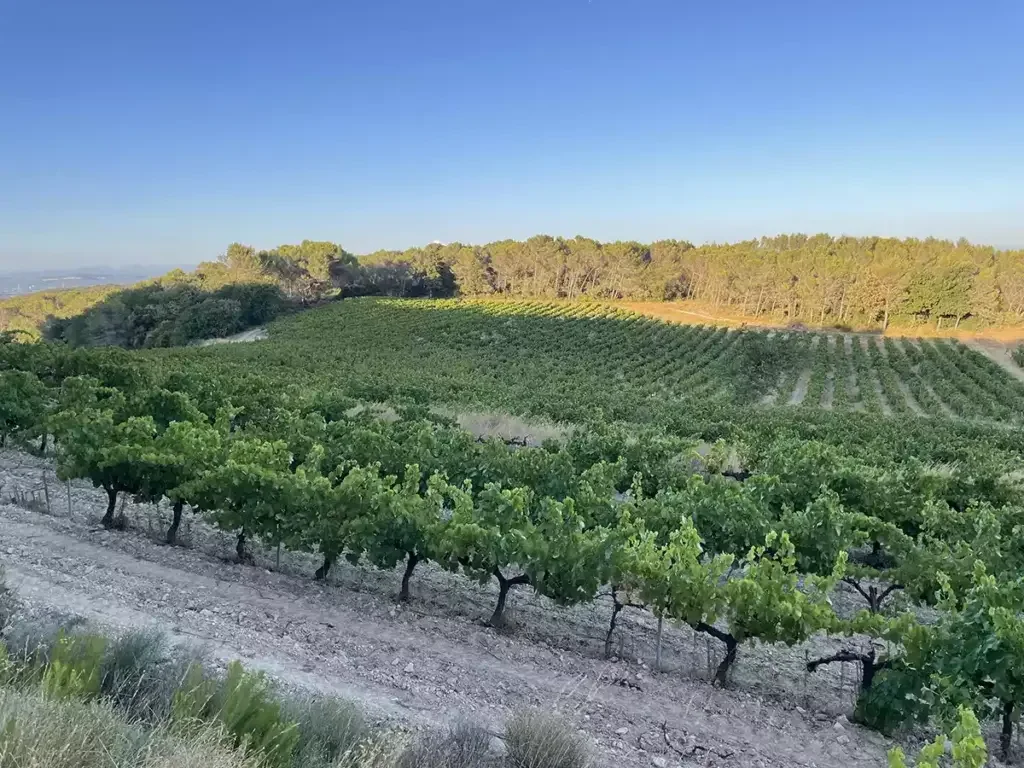
The road to Damascus and Les Deux Cols
Thus was born Les Deux Cols, named for two hills above one of the Estézargues vineyards while also referencing the two colleagues—who were soon to become three, necessitating the addition of three trees on the back label, when Gerard Maguire joined as an equal partner in 2017.
Maguire has had a more varied career than Tyrrell or Derain, starting with 15 years as a police detective, then the same again as a lawyer, before following his true passion and opening a wine shop—64 Wine—in the Dublin suburb of Glasthule. About ten years ago, when profiling this excellent shop, one of Ireland’s best, I wrote of Maguire: “It’s always nice to meet a fellow wine fanatic. You can drop all pretense at rational judgment and revel instead in the sort of shared enthusiasms that defy logic and confound those who think that a bottle of wine is a bottle of wine… Gerard Maguire is just such a fanatic, and my carefully compiled list of questions is abandoned as we snoop and delve around the cellar space at the back of 64 Wine in Glasthule. There’s barely enough floor space to stand, and you must pick your way carefully between the Château Latour and the Chave Hermitage, the Trimbach Clos Ste Hune and the Cuvée Frédéric Emile, the L’Ermita and the Gaja. Aladdin’s cave doesn’t begin to describe it.” Little has changed since then, except to say that under the guidance of Maguire’s business partner Anthony Robineau, the Aladdin’s cave now also contains a magnificent trove of great Burgundies.
Maguire’s involvement in Les Deux Cols came when Tyrrell and Derain realized that if they were to ever buy vineyards, they would need extra investment. Tyrrell explains: “We both had this desire to really get our hands dirty and to dive into the whole cycle. By the end of 2016 we began looking for vineyards… We were helped in this process by Denis Deschamps, who wanted to buy some vineyards as well, so he had his eye out for parcels going. It was actually Denis who eventually spotted the vineyards where we are today. I remember going there for the first time. It was this road-to-Damascus experience—I was completely seduced by the site.” Seduction was one thing, financial reality was another, so the pair asked Maguire, “whom we both knew very well from the wine business in Ireland,” to join them, “as an equal partner and investor.”
Equal is the word. Each echoes the other when speaking of the style they are aiming for, and though interviewed separately, their answers are facsimiles of each other, so it is necessary to quote only Derain: “We are focused on freshness. We’re not looking for concentration, we want everything ripe, but it is important not to confuse ripeness with overripeness. We are looking for a floral style with red fruits, raspberry and strawberry, not spice and black fruits—that is not our cup of tea. Light extraction, with good acidity and freshness, is what we are after.” But are they turning those words into wine?
Better wine and a better footprint
Les Deux Cols’ flagship wine, La Degève, is a 100 percent Grenache Vin de France, of which 750 bottles were produced in 2021. It comes from a hilltop single vineyard of stony limestone at an elevation of 600ft (180m) with a southwest exposure. The vines were planted in 2003, and all the vineyard work is done by hand, including harvest. Fermentation took place in stainless steel before maturation for ten months in used 500-liter demi-muids. On the palate, it does fit Derain’s verbal template, delivering the freshness he repeatedly mentions by way of a pleasant snap on the finish, yet one can’t help feeling that further refinement will move the style toward a snugger fit. Tyrrell says: “As new vignerons, we are still feeling our way through the vinification process—not so much in the actual fermentation itself, because I think we have a fairly clear idea of that, but certainly in the maturation process. We would like to be able to refine our maturation by moving to larger foudres… We love the profile that Grenache gives us in our area; to keep that delicate fruit style of Grenache that we want to produce, we need to invest in larger casks, probably 15hl foudres, and each one of those is almost €9,000.”
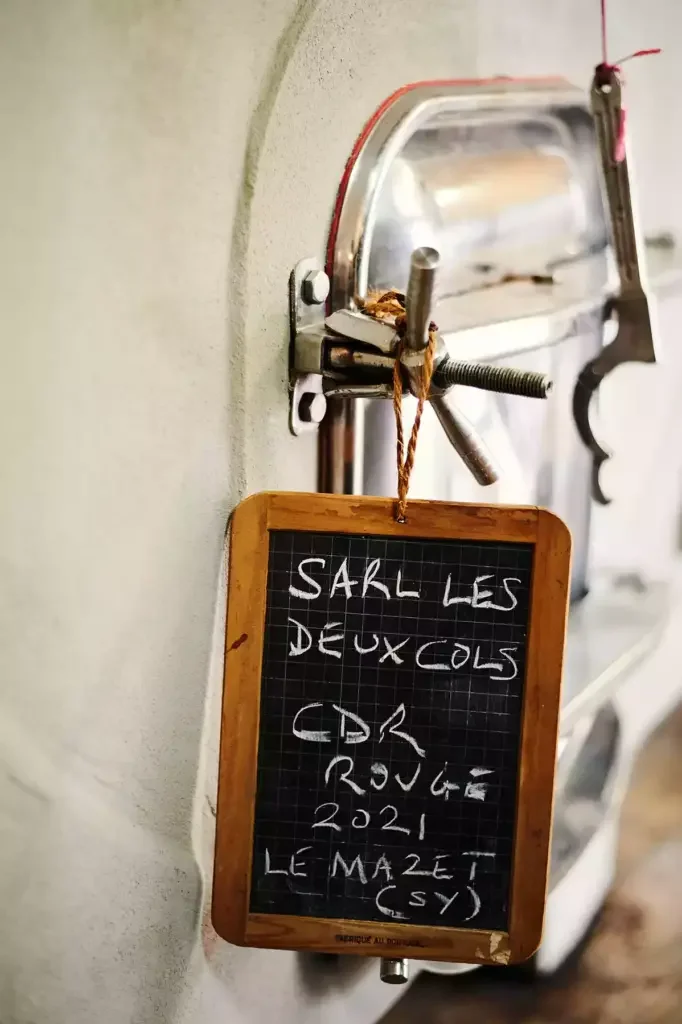
Worldwide, Grenache is having a moment right now. The deceptively pale, sweetly alcoholic wine of yore, useful as a filler to flesh out scrawny blends, has segued into something far more serious and worthy of note. Thus, by nailing their colors to that mast, the trio have the wind of fashion at their back, a force that is like the weather—difficult to predict and impossible to control, but hugely helpful when it chimes with your endeavors. Their timing in this regard could hardly be better.
Fashion may be on their side, but that should not disguise the fact that this trio have paid their dues, from beginning to end of the winemaking process; from clearing and planting vineyards by hand, to the business of selling, again by hand. Successful winemaking doesn’t finish when the wine is bottled. More hurdles in the form of sales and distribution lie ahead: taking samples to be tasted by importers and sommeliers; pouring wines for hour after hour at trade fairs; answering the same questions, elaborating the same story again and again. And again. Not to mention the administration.
Any wine lovers who harbor dreamy ambitions of buying a vineyard once their lottery numbers come up should have a word with Derain first, particularly if they favored buying in France, with its brain-bending bureaucracy: “It’s a pure nightmare. I am dealing with four or five different administrations just to make wine. You would need to employ someone just to understand it. It’s insane… You have to make good wine, you need to sell it, yet admin takes up 50 percent of your time. I don’t know how people do it. There is no way around it.” And for any who think that the administration is the only challenge: “Agriculture is hard work. We do everything ourselves. It is very demanding.” Dreams duly scotched. (The above quote is heavily redacted for, if one thing qualifies Derain for full Irish status, it is his ability to turn the air blue when the touch paper of French bureaucracy is dropped into the conversation, ladling on the expletives to rail against its labyrinthine complexities.)
It is barely an exaggeration to say that while the trio are understandably obsessed with wine quality, they are also fanatical about operating in as eco-friendly a fashion as possible. Maguire elaborates: “The three of us share an aspiration for improving; there are always things to improve, you never achieve your goal. We want to make a better wine and leave a better footprint. Our legacy is that we should leave the vineyard land in a better condition than we found it. Care for the environment is a given, it’s in our DNA, there is never any need to discuss it.”
Tasting the early vintages from Les Deux Cols, I found myself reacting politely rather than enthusiastically, probably influenced by the fact that I knew all three and had a high regard for what they were doing. Today, the wines have a certain assurance and a clearer identity than in the early years. Yet there is no doubt they can go further by way of refinement and elegance. The adolescent years are ending—adulthood beckons, and it is full of promise.

